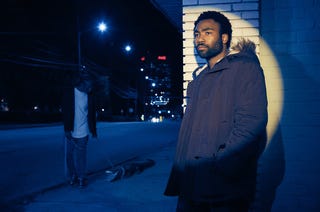
It's been a minute—a president ago—since Atlanta's first season entranced us. The show quickly became a career launching pad for its core cast: far-out buddy Lakeith Stanfield traveled to the sunken place; sometimes-girlfriend Zazie Beetz is in surefire blockbuster Deadpool 2; upstart rapper Brian Tyree Henry got some guest spots on How to Get Away With Murder,This Is Us and Drunk History, not to mention a role in that Barry Jenkins-directed James Baldwin adaptation; and Donald Glover got gigs as Star Wars' Lando Calrissian and The Lion King's Simba, in addition to making the aphrodisiac of our time in "Redbone."
Of course, there are also the awards and recognition Atlanta itself got, including two Emmys (outstanding director and outstanding lead actor in a comedy series for Glover) and two Golden Globes (best comedy and best actor in a TV series—musical or comedy).
But no matter how many creative lives Glover might live, there's always going to be a special attachment for Atlanta. On paper, it's a buddy comedy equipped with woke-era expectations. At its beating core, Atlanta's first season is about the real absurdities black America must navigate daily. The black Justin Bieber bit doesn't work only in the sense that—heh heh—of course actual Justin Bieber isn't black. It's that you couldn't fathom Justin Bieber getting away with what he has if he was Black.
After a year-and-a-half layover, Atlanta returns with a bit more menace (it's officially Atlanta: Robbin' Season now) while thankfully doubling down on the loose folkloric charm that gave it definition. Within the season's early episodes, we get introduced to the myth of the Florida Man—a creature who lives for anti-blackness—and rollick through a plot that takes us through a robbery, a surreal white music outreach program, a gift card scam and Sportin' Waves. There's a golden gun thrown in somewhere, too, but Atlanta retains a clear-headed sense of pacing that gives the chaos fluidity.
Atlanta's first season paid little attention to its core plot: Earn's (Glover) desire to manage his cousin, rapper Paper Boi (Henry), in an effort not to be broke. That lack of focus was sort of the point—in Atlanta, ennui and absurdity live in tight proximity—but Robbin' Season is hinting at more motion on that front. The sophomore run gets its title from the sense of desperation that awakens during the holiday season. It's not quite the backbone, but Glover and Henry's nuanced performance really sell it as subtext.
The season makes sure to note that Earn needs Paper Boi, not the other way around. When Earn tries to assure Paper Boi that a visit to a very white music startup will be good—in the same frail tone coaches use to cling to moral victories—the perpetually annoyed star responds, "If you say so. I'll see all that when I get that check, tho." The sentiment escapes with a gravelly mumble, like a demand muffled by familial courtesy. Like with a lot of Atlanta, much is said with little.
And like the first season, Robbin' Season benefits from a layer of specificity. The Sportin' Waves pomade has been used by African-American men for decades, yet Atlanta's second episode is the first time I've ever seen the joy and futility of that experience gifted with its own subplot. In a letdown many black men personally know, Paper Boi's ex-prisoner friend—played endearingly by Khris Davis—realizes the sense of power his waves emanate only goes so far in white spaces, no matter how juicy they are. Atlanta also makes its way around to the concept of trying to save money at the strip club, a scene that could be a read as a response to Jay-Z's "The Story of O.J." line.
Stanfield's Darius consistently comes through with the loony yet profound one-liners, while Beetz's Van remains a warm presence—though she doesn't pop up until episode three this time around. Atlanta is built around a likeable cast, a charm that should invest the audience in a season that looks like it'll have no trouble subtly reminding you of the stakes (see the music: Tay-K's "The Race" is a clash of boyishness and violence, much like the robbery it pops up in; Rene and Angela's "I'll Be Good" soundtracks the guest appearance of Katt Williams, who's of course in a no-good coupling).
Robbin' Season looks like it'll press violence, disaster and surrealism into a claustrophobic microcosm, a curious mix that looks promising for what was already one of cable television's most groundbreaking shows. As Darius says, there's a vibe here.


0 Yorumlar